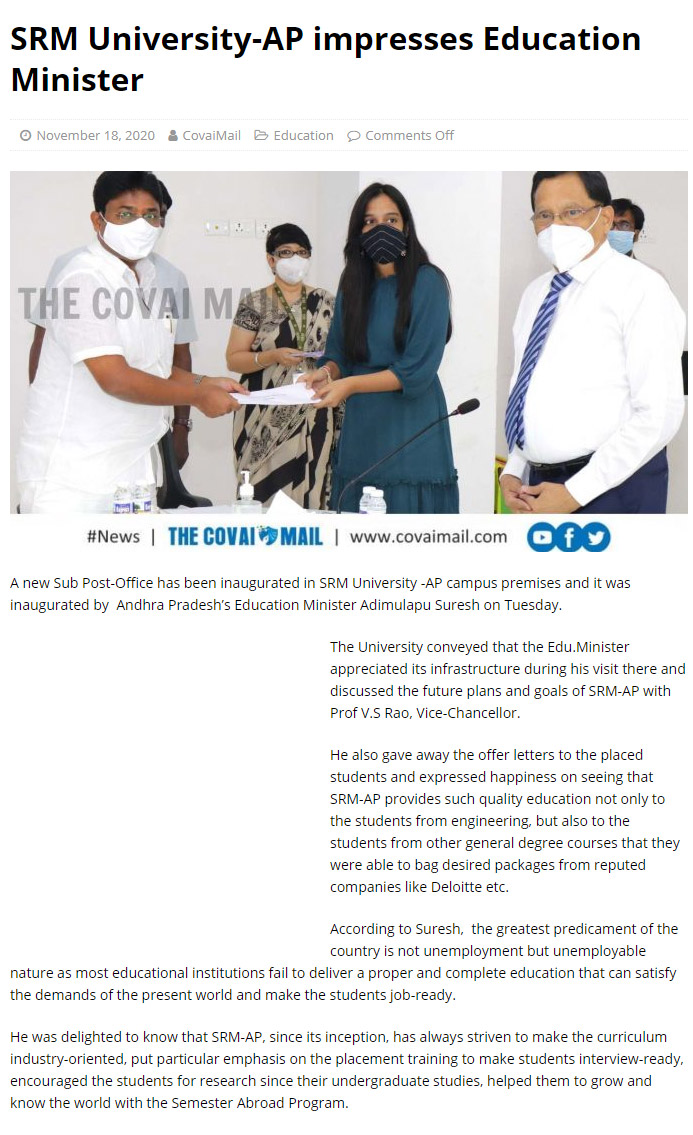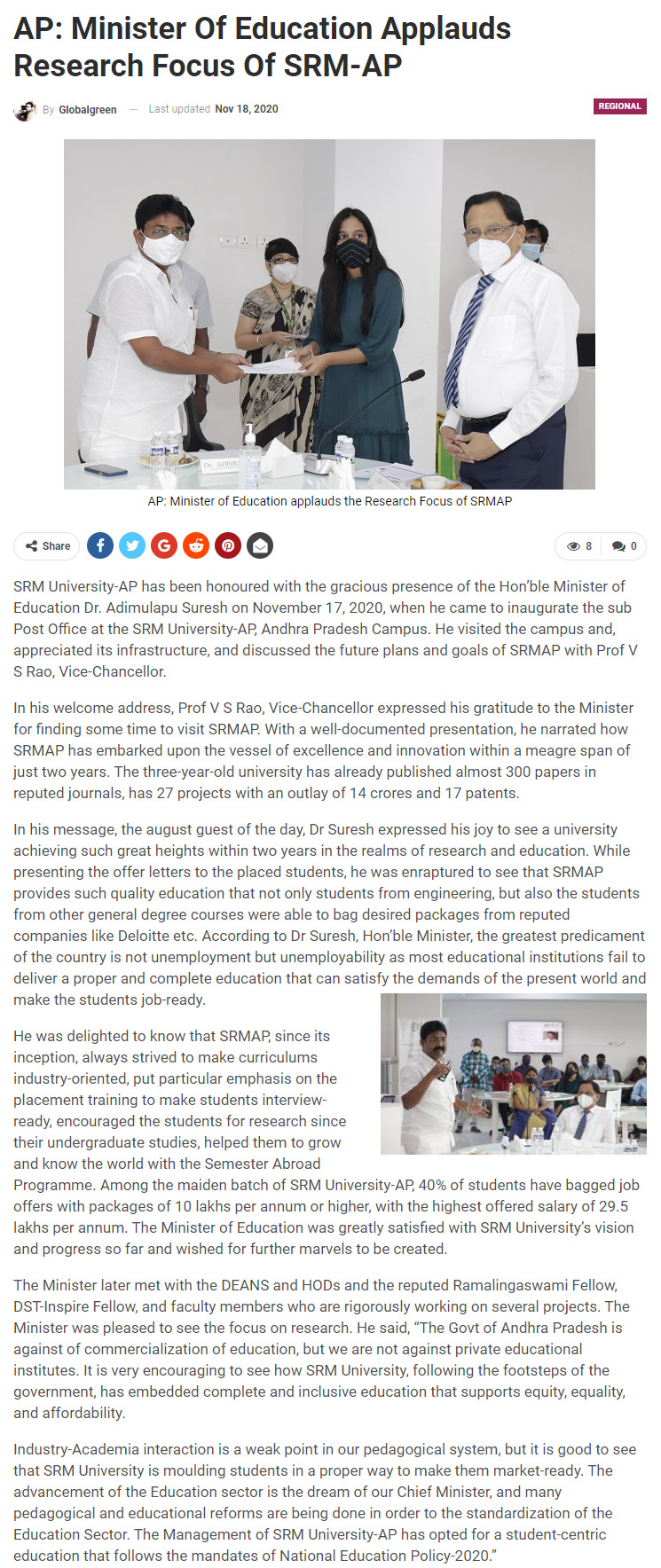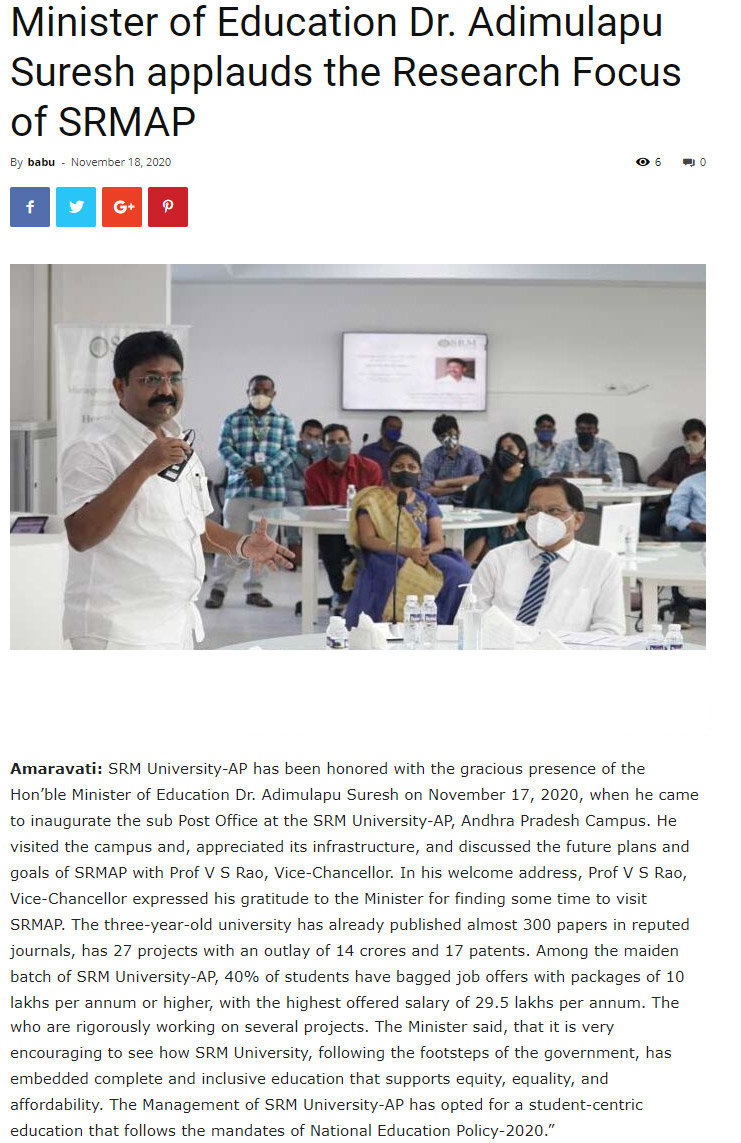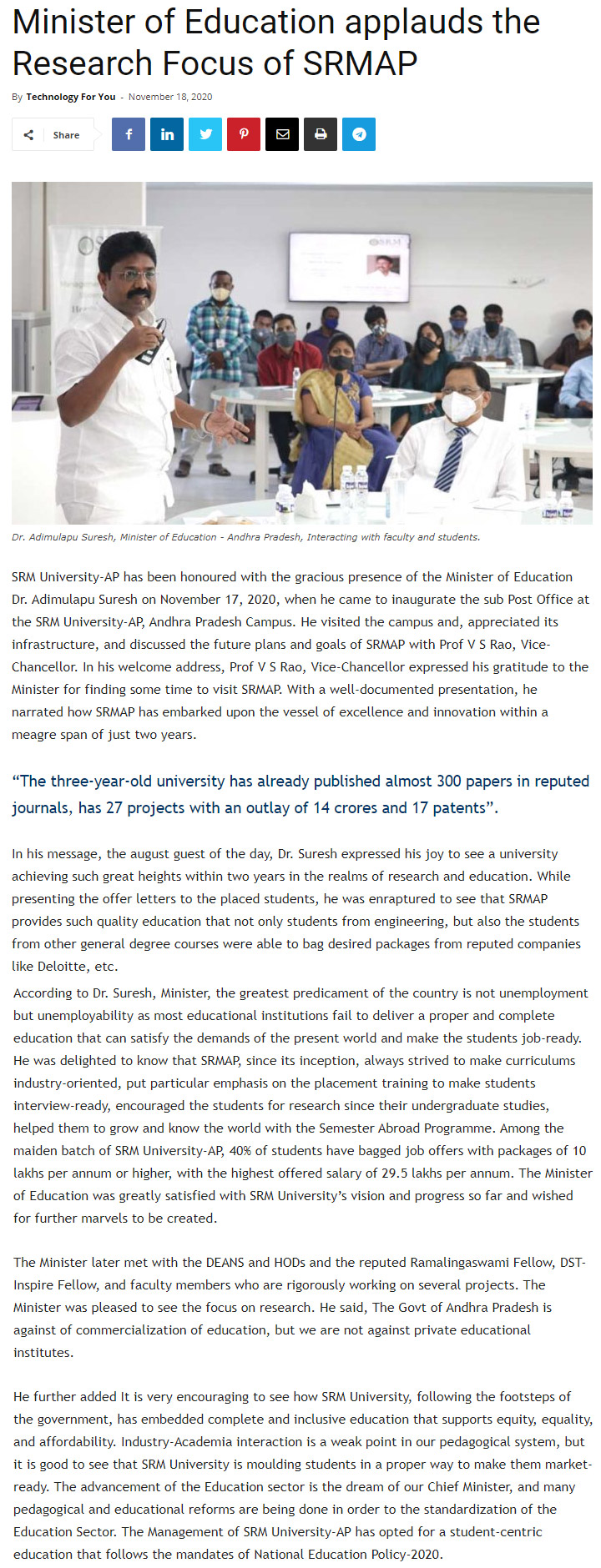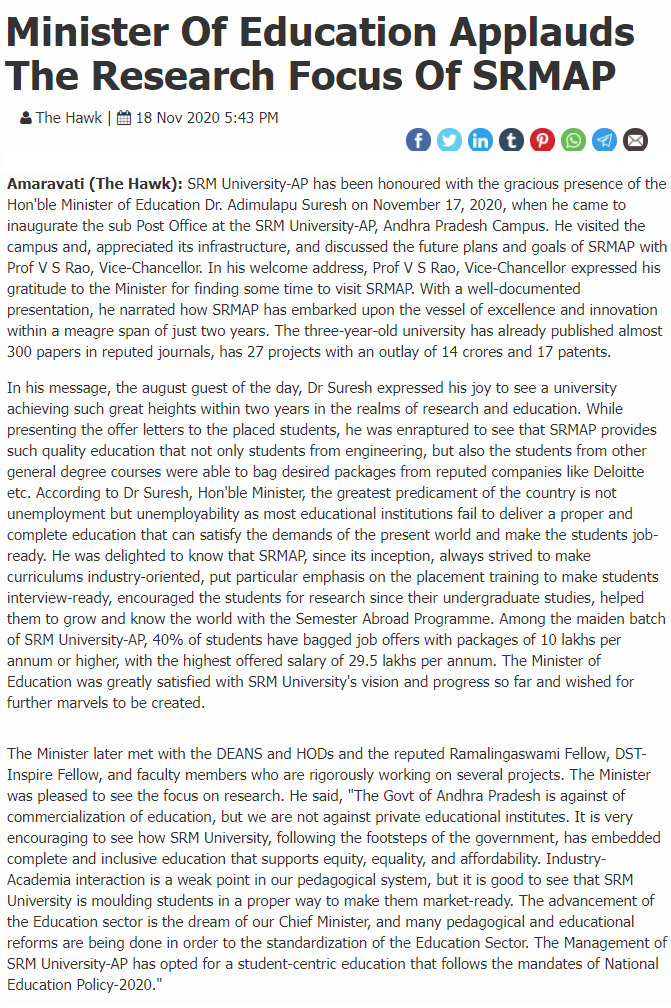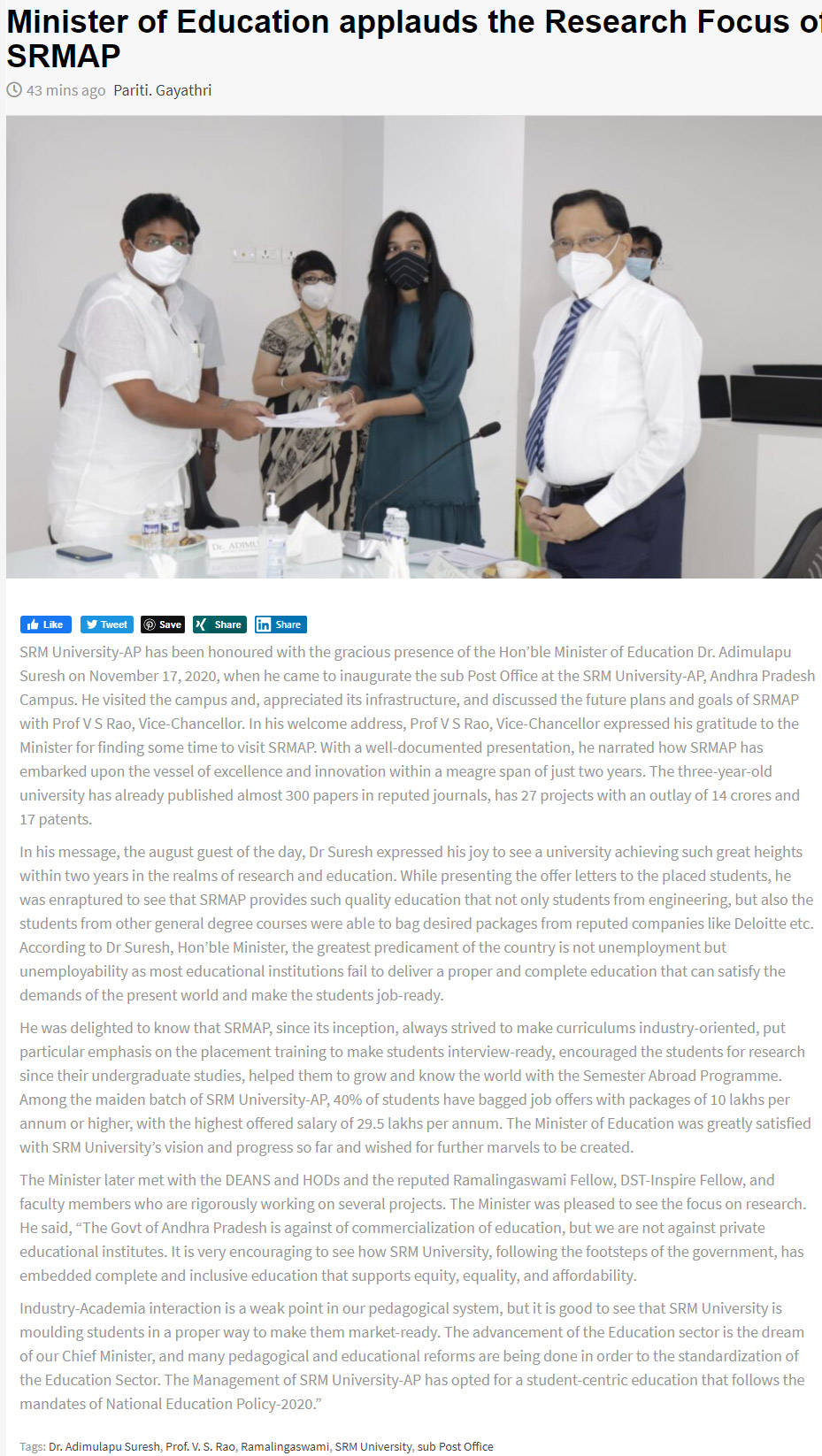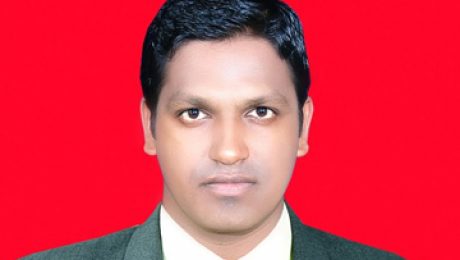Dr Tousif Khan N elected as a Joint Secretary of ACDOS
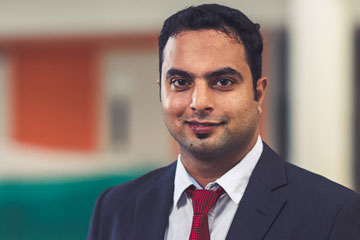 Dr Tousif Khan N, Head of the Department, Electrical and Electronics Engineering at SRM University-AP, Andhra Pradesh has been elected as a Joint Secretary (2020-2023) of the prestigious Automatic Control and Dynamic Optimization Society (ACDOS), Indian national member organization of International Federation of Automatic Control (IFAC). The objective of ACDOS is to promote automatic control and dynamic optimization fields in academia and industry across India. The society aims to host international conferences and technical workshops regularly in order to promote close interaction between industry professionals and academia. The society also participates in curriculum development for graduate and under-graduate studies in addition to facilitating productive research in this area. The society volunteers to honour eminent persons who excelled in this field in industry and academic circles.
Dr Tousif Khan N, Head of the Department, Electrical and Electronics Engineering at SRM University-AP, Andhra Pradesh has been elected as a Joint Secretary (2020-2023) of the prestigious Automatic Control and Dynamic Optimization Society (ACDOS), Indian national member organization of International Federation of Automatic Control (IFAC). The objective of ACDOS is to promote automatic control and dynamic optimization fields in academia and industry across India. The society aims to host international conferences and technical workshops regularly in order to promote close interaction between industry professionals and academia. The society also participates in curriculum development for graduate and under-graduate studies in addition to facilitating productive research in this area. The society volunteers to honour eminent persons who excelled in this field in industry and academic circles.
Dr Tousif Khan N is an Assistant Professor in the Department of Electronics and Electrical Engineering at SRM University-AP, Andhra Pradesh. He has obtained his PhD from Indian Institute of Technology, Guwahati. Apart from performing his duties as a teacher, he is pursuing his research career in Control systems, Power Electronics and Optimization Techniques. The very young and talented professor has been honoured with several awards and recognitions for his pursuits in the domains of Teaching and Research. As a Joint Secretary of ACDOS, Dr Khan wishes to contribute further to the versatile worlds of Research and Academia.
The other members of ACDOS are eminent researchers and scientists such as Prof. Sukumar Mishra (IIT Delhi) as President, Dr Jayesh Barve (GE, Bangalore) as Vice-President and President-Elect, Dr Shaik Faruque Ali (IIT Madras) Vice-President, Prof Bidyadhar Subudhi (IIT Goa) as Vice-President, Dr Arnab Maity (IIT Bombay) as General Secretary, Dr S. N Omkar (IISc-Bangalore) as Treasurer and Prof Radhakant Padhi (IISc Bangalore) as Director of Operations.
To know more about ACDOS, please click the link: https://www.acdos.org/
Dr Lakhveer Singh’s impactful research proposes remedial strategies for mitigating phthalate pollution
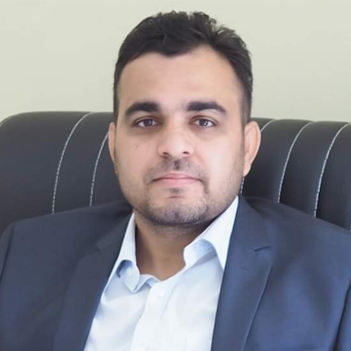 Dr Lakhveer Singh, Assistant Professor, Department of Environmental Science, SRM University-AP, Andhra Pradesh published an article titled “Remediation strategies for mitigation of phthalate pollution: Challenges and future perspectives” in the Journal of Hazardous Materials, with an Impact Factor of 9.03. In recent times, there has been an escalating concern over the risk of phthalate exposure leading to adverse effects on human health and the environment. Dr Lakhveer acknowledged the necessity of understanding the current status of phthalate pollution, their sources, exposure routes, and health impacts, along with understanding the remediation technologies for mitigating such issues.
Dr Lakhveer Singh, Assistant Professor, Department of Environmental Science, SRM University-AP, Andhra Pradesh published an article titled “Remediation strategies for mitigation of phthalate pollution: Challenges and future perspectives” in the Journal of Hazardous Materials, with an Impact Factor of 9.03. In recent times, there has been an escalating concern over the risk of phthalate exposure leading to adverse effects on human health and the environment. Dr Lakhveer acknowledged the necessity of understanding the current status of phthalate pollution, their sources, exposure routes, and health impacts, along with understanding the remediation technologies for mitigating such issues.
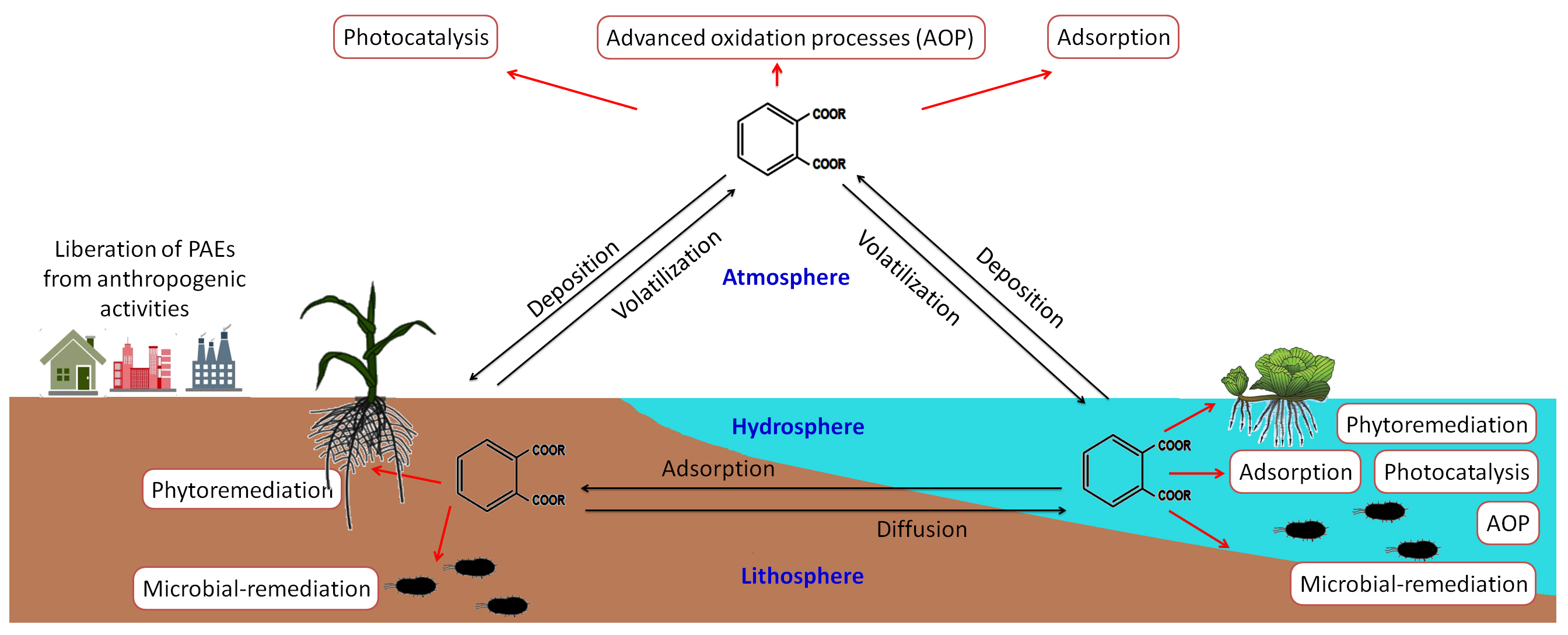 In this collaborative work between Indian Institute of Technology, Delhi, Jawaharlal Nehru University, and SRM AP, Dr Lakhveer enumerates the major phthalates in use today, shares insights on the ever-increasing data on health burdens posed by phthalates and simultaneously, highlights the recent advancements in research to alleviate phthalate contamination from the environment. Tracing their environmental fate, he addresses the growing health hazard concerns imposed by phthalates, along with focusing on understanding the different physical, chemical, and biological treatment of phthalates that are currently being used.
In this collaborative work between Indian Institute of Technology, Delhi, Jawaharlal Nehru University, and SRM AP, Dr Lakhveer enumerates the major phthalates in use today, shares insights on the ever-increasing data on health burdens posed by phthalates and simultaneously, highlights the recent advancements in research to alleviate phthalate contamination from the environment. Tracing their environmental fate, he addresses the growing health hazard concerns imposed by phthalates, along with focusing on understanding the different physical, chemical, and biological treatment of phthalates that are currently being used.
Dr Lakhveer explains, “Depending on the degree and nature of contamination, PAEs can be eliminated from different environmental matrices via various available processes such as adsorption, coagulation-flocculation, microbial biodegradation, phytoremediation, photocatalysis, and advanced oxidation processes. However, the efficiency of all these processes depends on various factors including inherent Physico-chemical nature of phthalates, environmental factors, and technological sufficiency.” Thus, advancing his research work in the future, Dr Lakhveer will opt for a holistic approach to develop novel processes for the remediation.
- Published in News, Research News
Sub-Post Office at SRMAP
The Hindu Nov-18
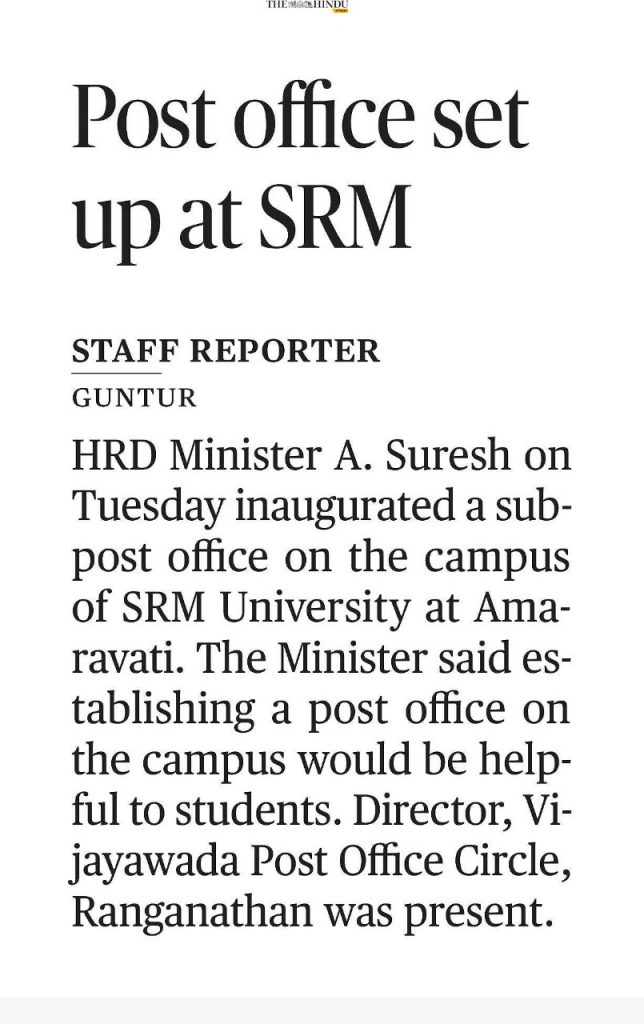
Deccan Chronicle Nov-18

Daily Pioneer Nov-18

Hans India Nov-18
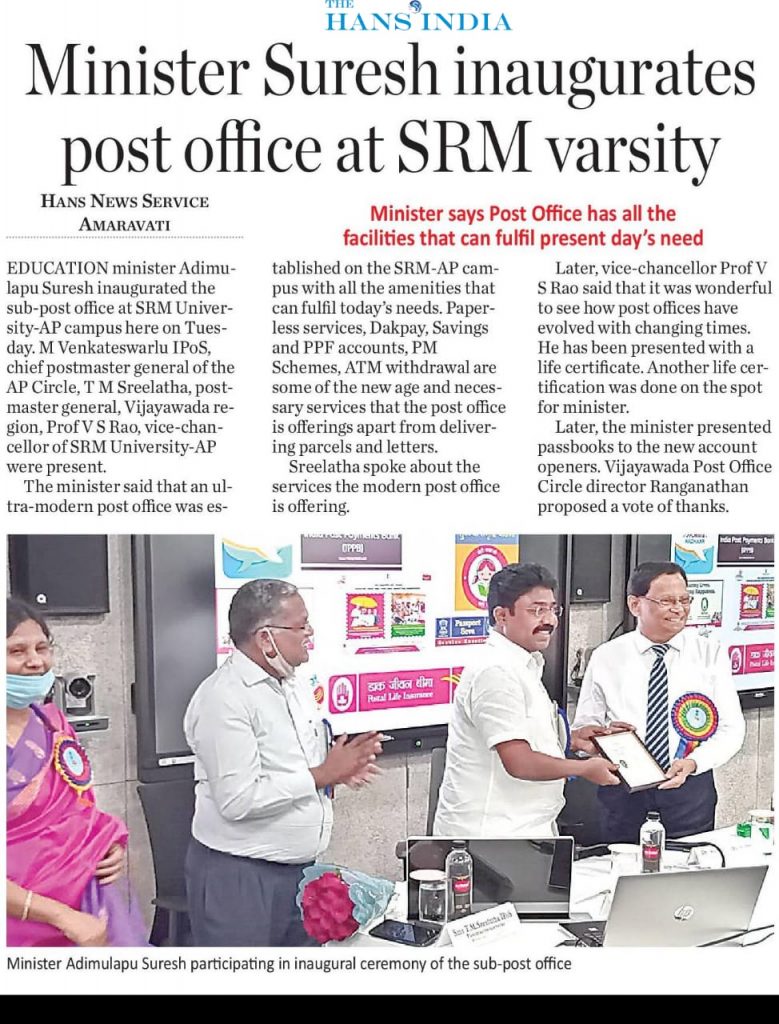
Eenadu Nov-18
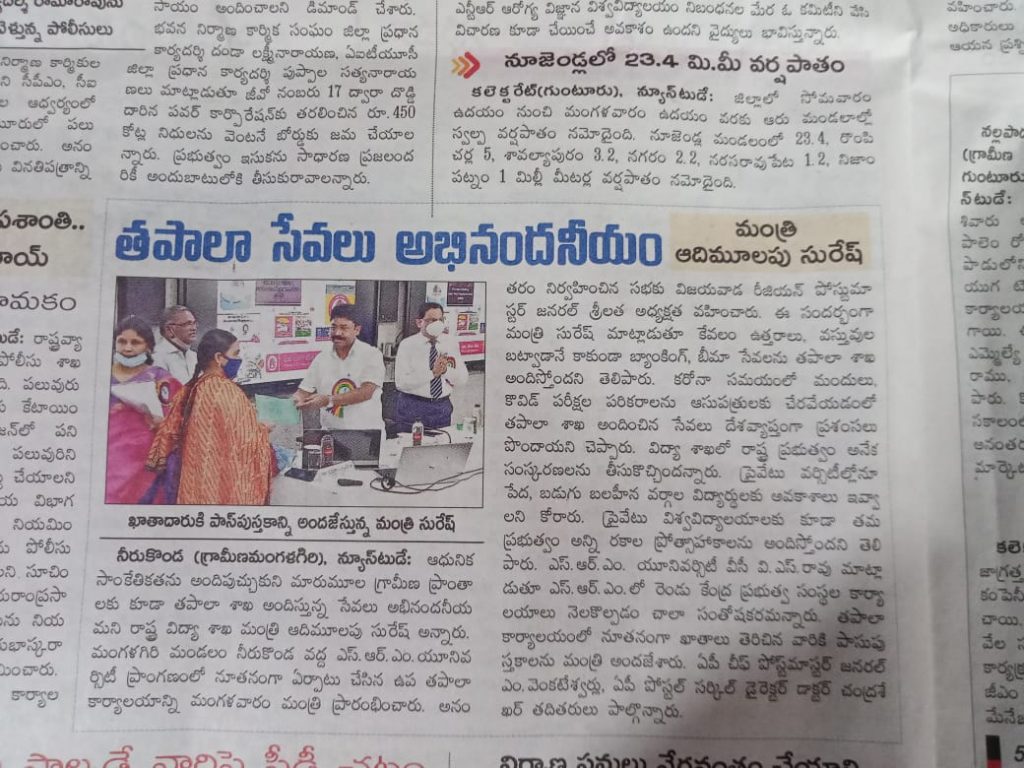
Sakshi Nov-18
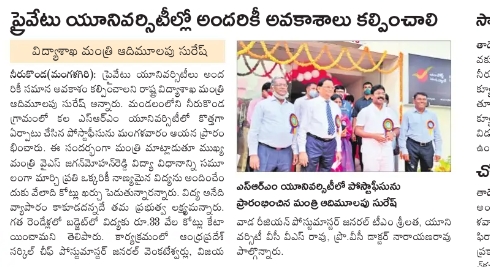
Andhra Jyothi Nov-18
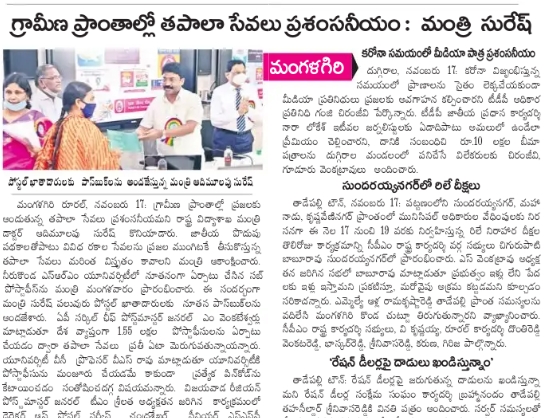
Andhra Prabha Nov-18
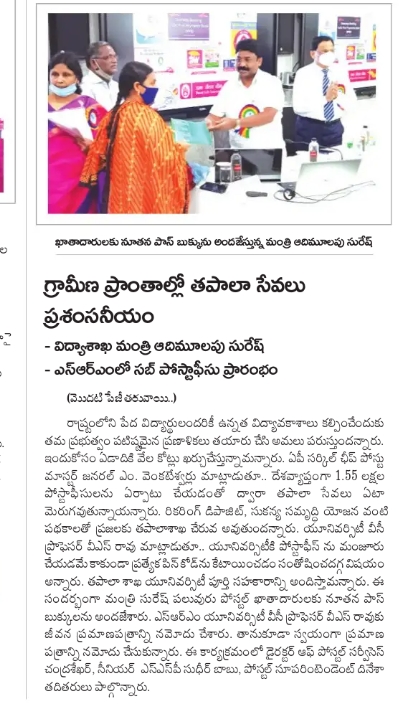
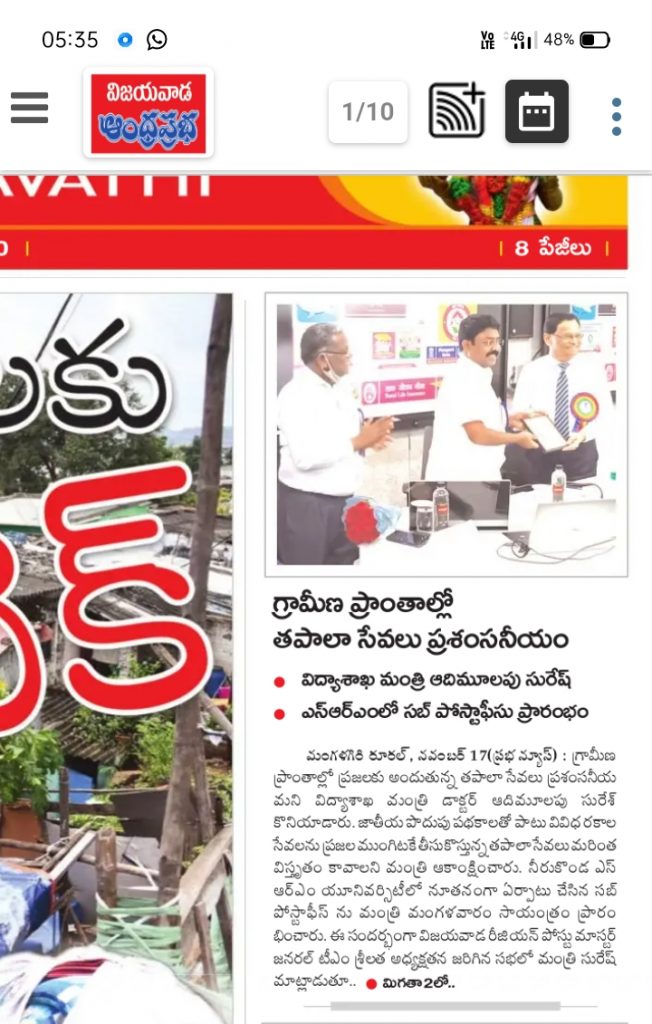
Sakshi Nov-18
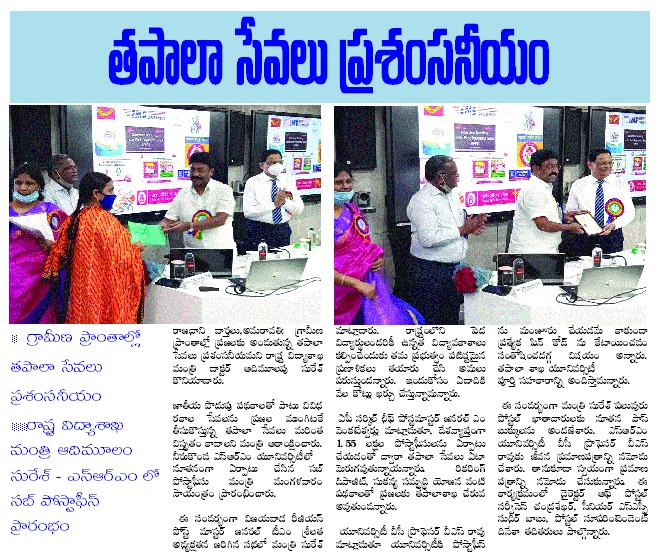
United News of India Nov-18
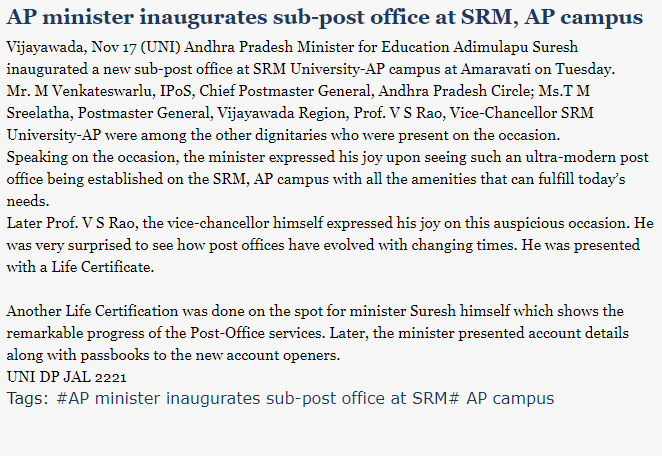
India Education Diary Nov-18
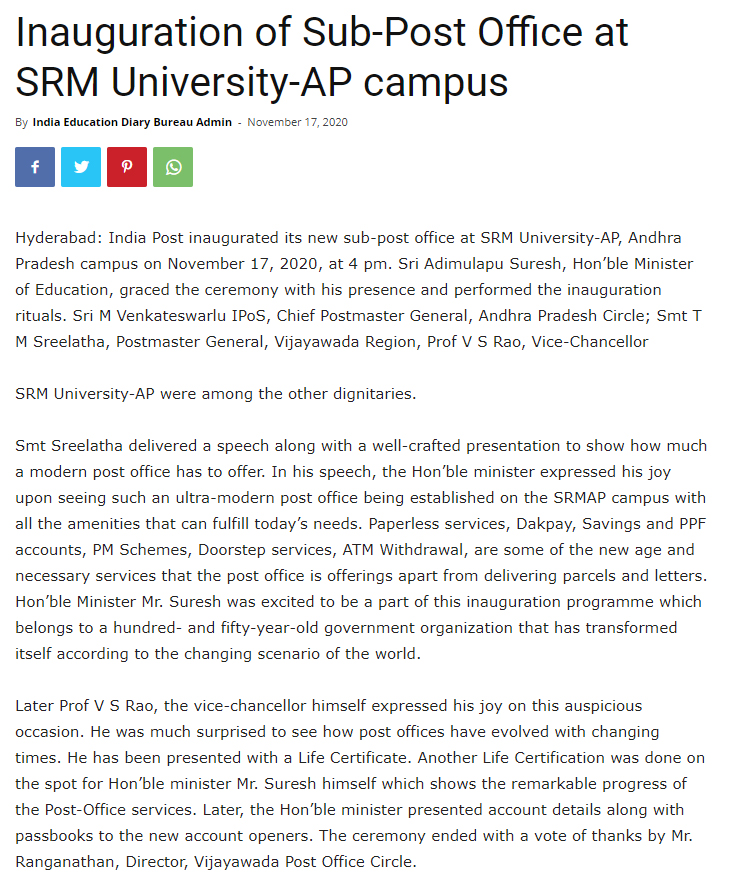
Higher Education Digest Nov-18
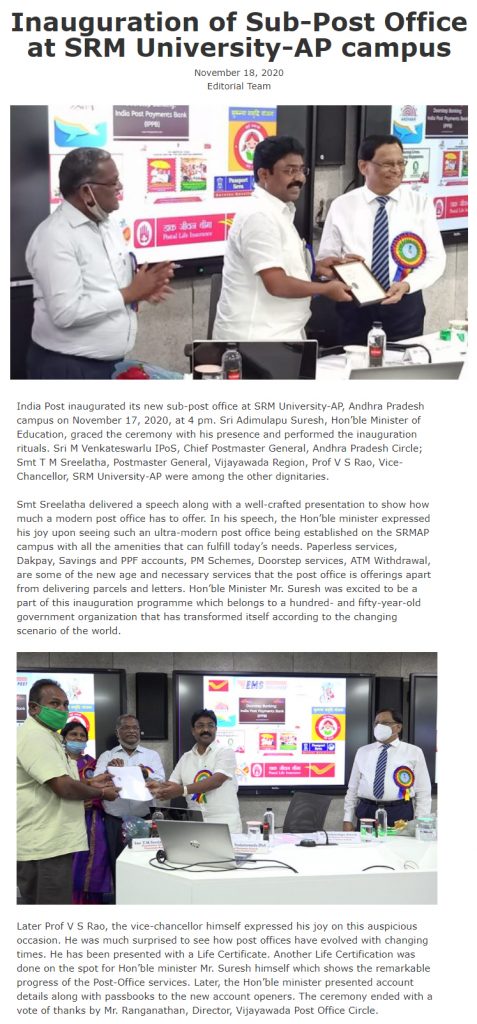
Media Bulletins Nov-18
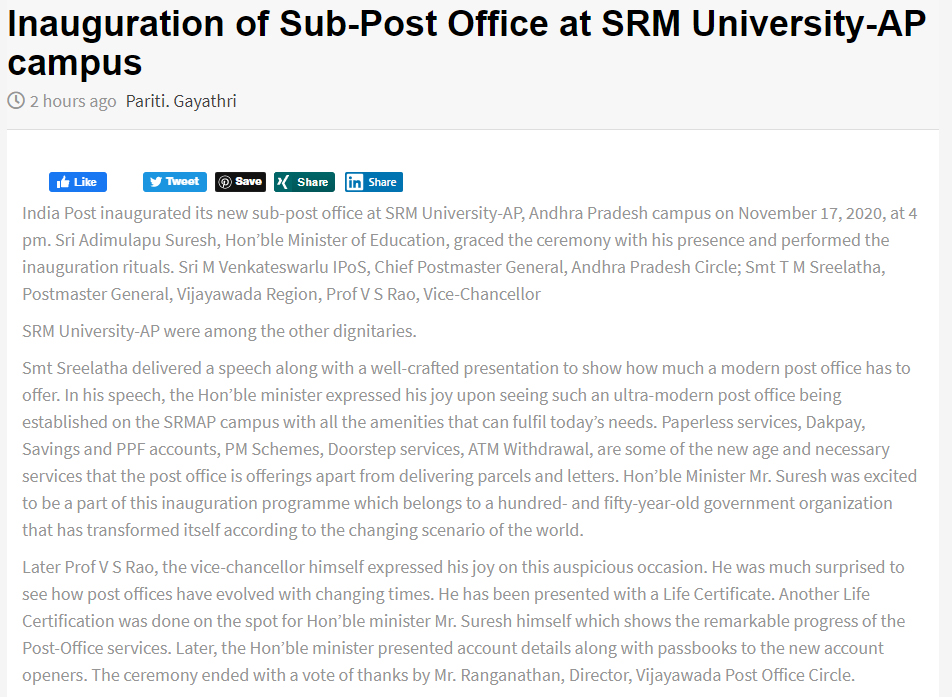
Global Green News Nov-18
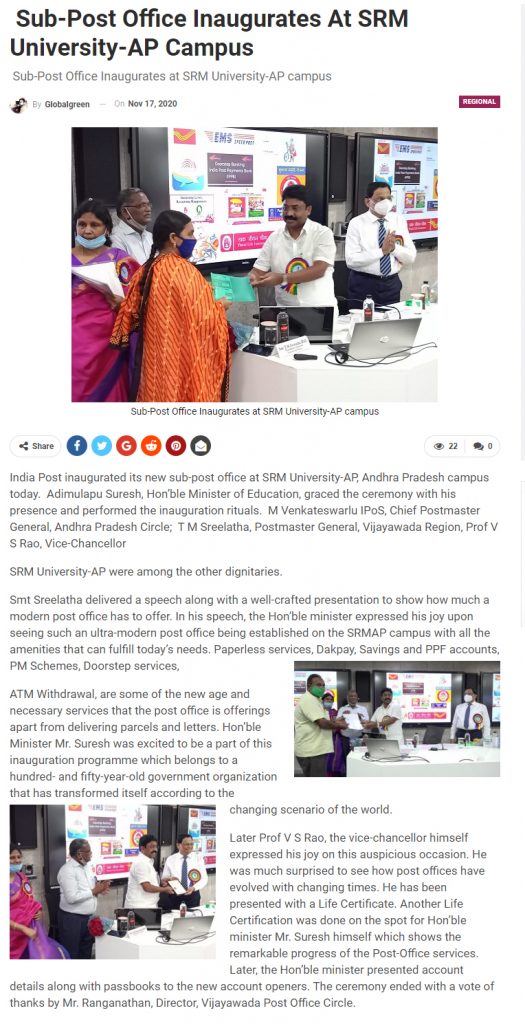
Business News This Week Nov-18
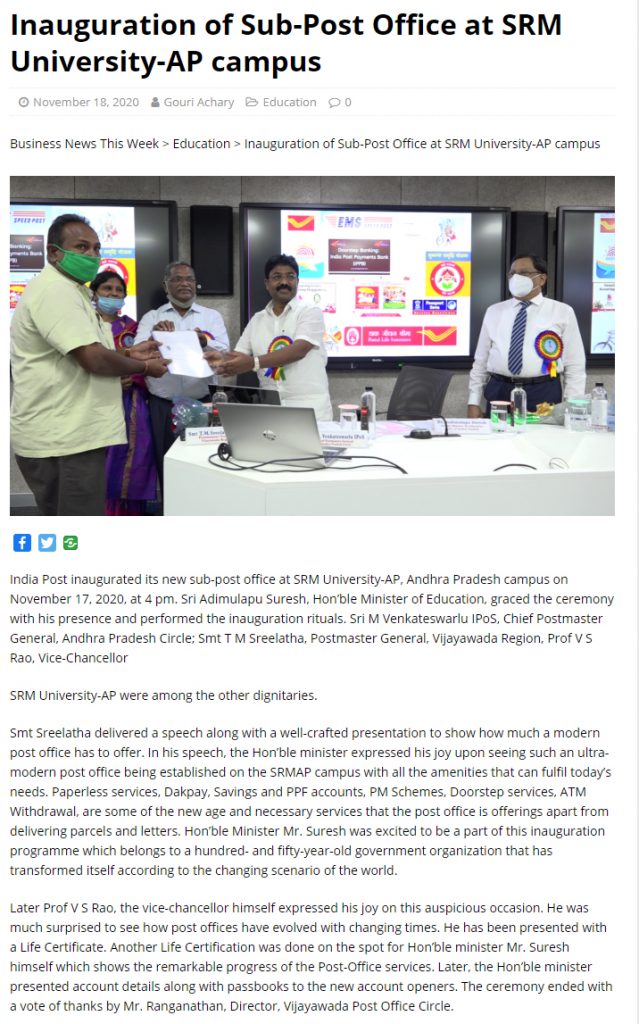
- Published in Newsroom
Dr Goutam Kumar Dalapati develops high-performance photodetectors with improved electrical parameters
 Dr Goutam Kumar Dalapati, Associate Professor, Department of Physics, SRM University-AP, Andhra Pradesh, published a research paper “Improvement on Photoresponse Properties of Self-Powered ITO/InP Schottky Junction Photodetector by Interfacial ZnO Passivation” in the reputed Journal of Electronic Materials, Springer. Photodetection has emerged as the key technology in contemporary science because of their wide range of applications in daily life and in industry, including astronomy, surveillance, environmental monitoring, machine vision, and cameras in smart phones. Commercial photodiodes should meet the criteria of high charge carrier mobility, small exciton binding energy, and higher stability. This intrigued Dr Goutam to indulge in the study of photodetector which is essential to improve several electrical parameters such as low power consumption, and higher sensitivity.
Dr Goutam Kumar Dalapati, Associate Professor, Department of Physics, SRM University-AP, Andhra Pradesh, published a research paper “Improvement on Photoresponse Properties of Self-Powered ITO/InP Schottky Junction Photodetector by Interfacial ZnO Passivation” in the reputed Journal of Electronic Materials, Springer. Photodetection has emerged as the key technology in contemporary science because of their wide range of applications in daily life and in industry, including astronomy, surveillance, environmental monitoring, machine vision, and cameras in smart phones. Commercial photodiodes should meet the criteria of high charge carrier mobility, small exciton binding energy, and higher stability. This intrigued Dr Goutam to indulge in the study of photodetector which is essential to improve several electrical parameters such as low power consumption, and higher sensitivity.
 In this research, Dr Goutam developed a high-performance photodetector using Indium phosphide/indium tin oxide (InP/ITO) semiconductor metal junction. He explains, “Photodetection in semiconductors follows the principle of generating electron-hole pairs under incident light higher than or equal to its bandgap. In Schottky type photodiode, at thermal equilibrium, the Fermi levels of the metal and the semiconductor are equalized, and a transfer of electronic charge occurs from the semiconductor to the metal. Moreover, these charge transport properties can be simply tailored by compositional engineering, which provides plenty of space to modulate the performance metrics of the photodetectors. During my research, the atomic layer deposition of zinc oxide (ZnO) on the InP surface was found to increase the valence band offset for current conduction in the photodiode. Photoresponse properties were believed to improve through effective hole blocking by the ZnO interface layer which further prevents the surface recombination of photo-induced generated electron-hole pair. Through my research, I deciphered that the ITO/ZnO/InP photodiode exhibited a maximum photoresponsivity of 44.2 mAW−1 under a 520 nm laser irradiation with an illumination power of 1 μW at the zero bias voltage.”
In this research, Dr Goutam developed a high-performance photodetector using Indium phosphide/indium tin oxide (InP/ITO) semiconductor metal junction. He explains, “Photodetection in semiconductors follows the principle of generating electron-hole pairs under incident light higher than or equal to its bandgap. In Schottky type photodiode, at thermal equilibrium, the Fermi levels of the metal and the semiconductor are equalized, and a transfer of electronic charge occurs from the semiconductor to the metal. Moreover, these charge transport properties can be simply tailored by compositional engineering, which provides plenty of space to modulate the performance metrics of the photodetectors. During my research, the atomic layer deposition of zinc oxide (ZnO) on the InP surface was found to increase the valence band offset for current conduction in the photodiode. Photoresponse properties were believed to improve through effective hole blocking by the ZnO interface layer which further prevents the surface recombination of photo-induced generated electron-hole pair. Through my research, I deciphered that the ITO/ZnO/InP photodiode exhibited a maximum photoresponsivity of 44.2 mAW−1 under a 520 nm laser irradiation with an illumination power of 1 μW at the zero bias voltage.”
For the successful implementation of the proposed ITO/ZnO/InP photodiode in the manufacturing levels, significant efforts are essential. Dr Goutam acknowledges that device to device variability must be addressed which arise from the deposition condition of the ZnO layer by atomic layer deposition. Surface defects reduction and selection of charge collecting electrodes must be optimized to improve the performance of the photodetector. Thus, Dr Goutam will dedicate his future research work to study patterned 2D graphene-based electrode to improve the performance. Also, n-type 2D MoS2 and hexagonal boron nitride (hBN) passivation will be studied by him on the III-V semiconductor surface for better photoresponsivity.
- Published in News, Research News
Minister of Education applauds the Research Focus of SRMAP
- Published in Newsroom
Department of Student Affairs organize a session with budding entrepreneurs
 Department of Student Affairs, SRM University-AP, Andhra Pradesh organizes yet another chapter of Newsmakers. On November 21, 2020, at 5 PM, Sourav Sanyal, Miran Junaidi, and Saurabh Ghanekar, 4th year, Department of Computer Science and Engineering will be narrating their tale of forming a start-up named oureye.ai. The young entrepreneurs developed an automated, end-to-end video intelligence solution for enterprises to monitor surveillance camera recordings, leveraging pre-existing CCTV-IP infrastructure.
Department of Student Affairs, SRM University-AP, Andhra Pradesh organizes yet another chapter of Newsmakers. On November 21, 2020, at 5 PM, Sourav Sanyal, Miran Junaidi, and Saurabh Ghanekar, 4th year, Department of Computer Science and Engineering will be narrating their tale of forming a start-up named oureye.ai. The young entrepreneurs developed an automated, end-to-end video intelligence solution for enterprises to monitor surveillance camera recordings, leveraging pre-existing CCTV-IP infrastructure.
The three brilliant students grabbed the opportunities provided by SRM AP and became an active member of the student-run technological club of SRM AP, Next Tech Lab. Further, they spent a semester at the University of California, Berkeley as part of the Semester Abroad Programme to broaden their horizon of knowledge. Encouraged by the mentors and faculty, the students participated in several international conferences and hackathons which kindled their interest in developing a platform that would provide practical solutions to real-life problems.
During the session, the students will share insights regarding their start-up. Also, they will narrate the inspiring journey that commenced with their erudite experience at SRM AP, which eventually enabled them to become young entrepreneurs. Their company generated a revenue of Rs. 1.7 million in the recent financial year.
- Published in Events, Students Affairs Events, Webinars
Students of SRM AP become successful young entrepreneurs
Enhancing surveillance by enabling CCTV cameras to produce actionable insights using AI-ML technology
 With the vision of bringing surveillance cameras to life, Sourav Sanyal, Miran Junaidi, and Saurabh Ghanekar, 4th year, Department of Computer Science and Engineering, SRM University-AP, Andhra Pradesh, founded OurEye.ai, an automated, end-to-end video intelligence solution for enterprises to monitor surveillance camera recordings, leveraging pre-existing CCTV-IP infrastructure. The young entrepreneurs extend their gratitude to SRM AP for shaping their career from the inception of their erudite journey with the university. Miran says, “The pioneering active learning pedagogy at SRM AP in place of a memory-based rote learning method enabled us to evolve as learners. Also, the approachable management at SRM AP supported and encouraged our ideas, steering us to the path of success. Today we feel honoured for achieving the ability to give back to the university that made us. We have the best talent at SRM AP and have employed 6 students on a part-time role.”
With the vision of bringing surveillance cameras to life, Sourav Sanyal, Miran Junaidi, and Saurabh Ghanekar, 4th year, Department of Computer Science and Engineering, SRM University-AP, Andhra Pradesh, founded OurEye.ai, an automated, end-to-end video intelligence solution for enterprises to monitor surveillance camera recordings, leveraging pre-existing CCTV-IP infrastructure. The young entrepreneurs extend their gratitude to SRM AP for shaping their career from the inception of their erudite journey with the university. Miran says, “The pioneering active learning pedagogy at SRM AP in place of a memory-based rote learning method enabled us to evolve as learners. Also, the approachable management at SRM AP supported and encouraged our ideas, steering us to the path of success. Today we feel honoured for achieving the ability to give back to the university that made us. We have the best talent at SRM AP and have employed 6 students on a part-time role.”
The idea of starting a company infused with innovative technology was instilled among the students by the student-run technological club of SRM AP, Next Tech Lab. Miran narrates, “ SRM AP gave us something that no other university has, which was Next Tech Lab. I met my batchmates, the co-founders of OurEye, at Next Tech Lab, where we built so much every day round the clock while having fun with technology. We could not be more grateful for the opportunity and freedom that we got at the lab. Also, SRM AP has Introduced us to mentors like Adithya and Anshuman, founders of Next Tech Lab, who have been there for us every single day and helped us in developing a problem solving and curious mindset.”
Along with sponsoring over 5 international conferences, SRM AP enabled the brilliant students to study a semester at the University of California, Berkeley as part of the Semester Abroad to broaden their horizon of knowledge. The trio envisioned this start-up while they were pursuing their semester at UCB. Miran remembers that when he lost his mobile phone in a park, they had to wait for 10 days for the CCTV supervisor to analyze the cameras. The three students identified that capital expenditure by businesses on setting up cameras is huge and return on investment is low. This drove them to ideate a platform that will send real-time notifications to the supervisors through embedded Artificial Intelligence and Machine Learning technology. OurEye enables businesses to deploy a remote auditor/quality controller through existing cameras. Based on industry requirements, the platform is programmed to observe and monitor, producing actionable insights to improve the business operations and scale.
Initially, the students commenced their journey by showcasing their platform in international hackathons. Recalling, Miran says, “The biggest challenge was to raise funds as it entails the daunting task of sharing your idea and vision with the rest of the world.” OurEye received $35000 from Sanjay Mehta led 100X.VC, and currently, comprises of 23 team members including the 3 co-founders. Being used by 11 companies across 17 outlets, the start-up generated a revenue of Rs. 1.7 million in the recent financial year. The students inform, “We’re learning so many new things and growing so very fast. We are now attempting to raise a new round of funds from foreign institutional venture capital. We also plan to add more features to the platform, hire a sales team to expand the client base to hospitals, schools, and commercial spaces. Very soon after the pandemic, we would be opening an office in Bangalore that would house 35 engineers, and other employees.”
- Published in News
SRMAP faculty recognised by Stanford University among the top Biotechnologists
Dr Imran Pancha from the Department of Biological Sciences, SRM university – AP is recognised in Biotechnology among the top 2% scientists/researchers across the world By Stanford University Researchers. Recently an article has been published in PLOS Biology by Stanford University Researchers on the highly cited researchers in 22 different fields and their subfields. In the Biotechnology field, 1,074 scientists/faculty members were identified, and Dr Imran Pancha is one amongst them. From India, only 77 scientists/faculty members could achieve this honour, and Dr Imran Pancha is one among them. This is an admirable achievement for a young faculty from a nascent University to be in the top 2% scientists of the world. Dr P Sathyanarayanan, the President of SRM University-AP honoured Dr Pancha for bringing this scientific laurel to the university.
Overall, of the top 160,000 scientists from different fields of Science & Technology, India hosts 2,313 scientists/faculty members. This list comprises of the prominent and illustrious scientists from India.
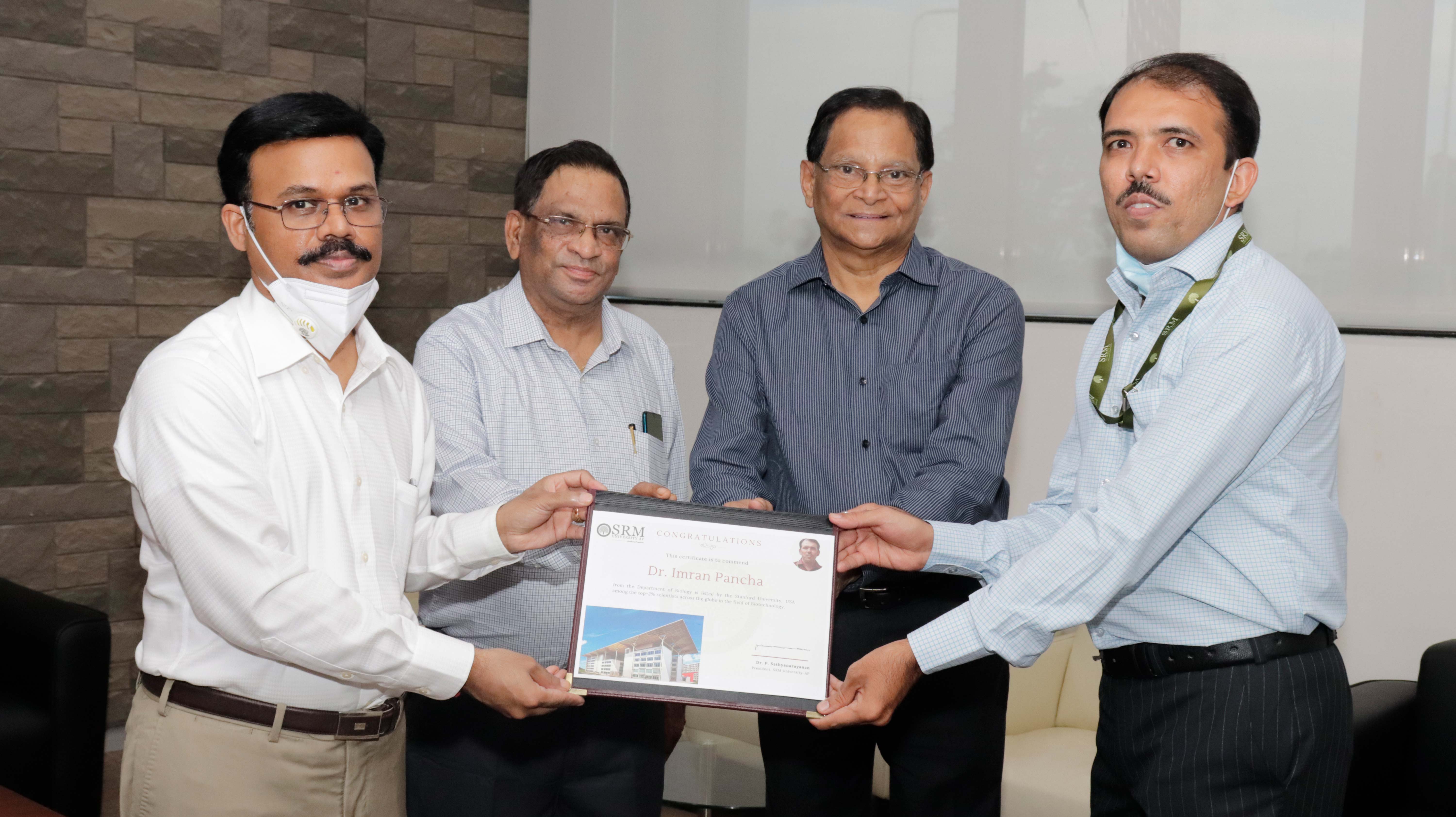
Dr Imran Pancha is a young researcher working as an Assistant Professor in the Department of Biological Sciences in SRM University-AP, Andhra Pradesh. He has obtained his doctoral degree from CSIR-Central Salt and Marine Chemicals Research Institute-Bhavnagar after graduating from Bhavnagar University. He has also worked as a post-doctoral fellow at Japanese Society for Promotion of Science, Japan before joining SRM University-AP.
Dr Pancha’s primary research focus is to produce renewable energy from microalgae. His team is trying to develop integrated microalgal bio-refinery to produce high-value compounds like phycobiliproteins, carotenoids along with biofuel and bio-fertilisers from microalgae. Apart from this, he is also interested to understand algal-bacterial interaction, particularly isolate and characterise the microalgae associated bacteria and finding their role in growth enhancement and inhibition in microalgae.
- Published in Biology News, News, Research News
Prof D Basavaiah to deliver insightful lecture during University Distinguished Lecture Series 05
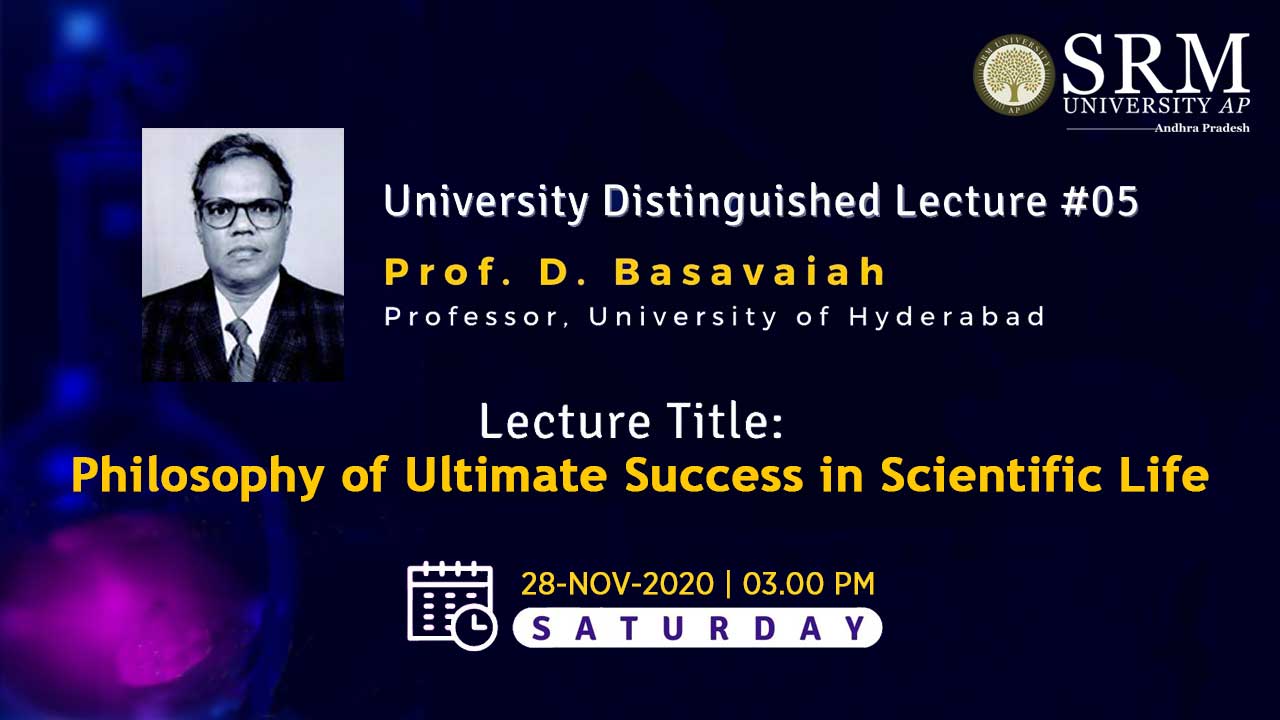 SRM University-AP, Andhra Pradesh presents the fifth edition of the University Distinguished Lecture Series on November 28, 2020, at 3 PM. Prof. D. Basavaiah, INSA Senior Scientist, Professor, School of Chemistry, University of Hyderabad will be addressing the audience and delivering an insightful lecture on “Philosophy of Ultimate Success in Scientific Life”. Prof D Basavaiah acquired his PhD in Organic Chemistry from Banaras Hindu University, following which he became a Postdoctoral Fellow at the Department of Chemistry, Purdue University, West Lafayette, USA. He has a gamut of experience in science and academia sprawled over 30 years in which he worked as a Scientist C, National Chemical Laboratory, Pune, after which he moved to the University of Hyderabad.
SRM University-AP, Andhra Pradesh presents the fifth edition of the University Distinguished Lecture Series on November 28, 2020, at 3 PM. Prof. D. Basavaiah, INSA Senior Scientist, Professor, School of Chemistry, University of Hyderabad will be addressing the audience and delivering an insightful lecture on “Philosophy of Ultimate Success in Scientific Life”. Prof D Basavaiah acquired his PhD in Organic Chemistry from Banaras Hindu University, following which he became a Postdoctoral Fellow at the Department of Chemistry, Purdue University, West Lafayette, USA. He has a gamut of experience in science and academia sprawled over 30 years in which he worked as a Scientist C, National Chemical Laboratory, Pune, after which he moved to the University of Hyderabad.
In his prolific career, Prof D Basavaiah won many accolades and awards for his contribution to science, which includes Professor T R Govindachari 60th Birthday Commemoration Endowment Award in Organic Chemistry in 1999-2000, CRSI Silver Medal in 2008, JC Bose Fellowship (DST-New Delhi) in 2008, National Best Teacher award in Chemistry in 2008 (sponsored by AV Rama Rao Research Foundation in association with IICT and AP Academy of Sciences), The Indian Science Congress Platinum Jubilee lecture award in Chemical Sciences in 2009, INSA- Professor TR Seshadri 70th Birthday Commemoration Medal in 2009, BHU Distinguished Alumnus Award in 2012, and many more. Prof D Basavaiah will apply his vast understanding of science to guide the audience during the UDL 05, which will benefit academicians, faculty, and students from diverse fields.
Registration Link: https:bit.ly/srmapUDL05 (Registration Closed)
- Published in Events, Research Events, University Distinguished Lecture, Webinars
Dr Lalita Mohan Mohapatra
- Published in Faculty, Management Faculty, SEAMS


